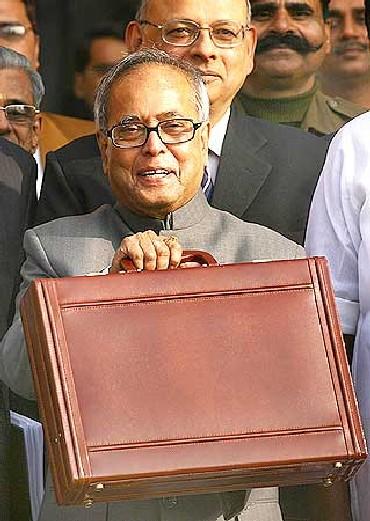Photographs: Vijay Mathur/Reuters Lalit K Jha in Washington
Amid recessionary fears in advanced economies, India's Finance Minister Pranab Mukherjee has called for channelising global surpluses to build infrastructure in developing nations to boost world economy.
Insisting that growth process needs to be made more broad-based and especially strengthened in developing countries, he said the G20 needs to focus more sharply on the development aspects.
"If we need to add demand to the global economy to offset the moderation of demand by industrialised countries as they contract final output, perhaps a good way of doing this is to expand infrastructure investment in developing economies," Mukherjee said.
He was speaking at the G20 Finance Ministers' and Central Bank Governors' dinner meeting here last evening. G20 is a grouping of developed and developing nations.
...
Channelise surpluses for infra in developing nations: Pranab
Photographs: Jo Yong hak/Reuters
Mukherjee said many emerging economies have developed the capacity to grow rapidly but are constrained by poor infrastructure.
"Financing infrastructure development in these economies could contribute to sustainable global growth," he added.
Talking about the G20 Cannes Summit, the Indian Finance Minister said that it should focus on medium-term growth. "...our medium term action plan for Cannes may not seem credible unless it addresses short-term growth and stability concerns as well," he said.
Mukherjee further said that the stress in euro zone and policy options of handling them should be in the G20 Framework.
...
Channelise surpluses for infra in developing nations: Pranab
"The need for doing so arises because of the highly interconnected nature of the world and to the potentially destabilising role that expectations in financial markets can play," Mukherjee added.
He also called upon the finance ministers of G20 and top bankers to take stock of the progress made since the Toronto Summit (2010) when global leaders decided on a series of measures related to the member countries.
Talking about the difficulties involved in making forward looking commitments according to the G20 Mutual Assessment Process (MAP), Mukherjee said, "some commitments asked for are outcomes over which governments do not have full control, such as fiscal deficits and current account imbalances."
...
Channelise surpluses for infra in developing nations: Pranab
Also, countries may be willing to commit "only what they have already made public so far. "Are countries in a position to make measurable, forward looking commitments beyond what is approved by their national Parliaments?," Mukherjee pointed out.
Taking up another issue related to commitments, he asked, "is there a danger of such measurable commitments leading to naming and shaming, that could be acrimonious and divisive, something that the G20 has so far avoided?"
The G20's MAP is a new approach to policy collaboration, conceived and owned by the members of the G-20. The goal is to ensure that collective policy action will benefit all.
Like any new initiative, the MAP will be fully fleshed out over time, in large part through learning by doing.





article